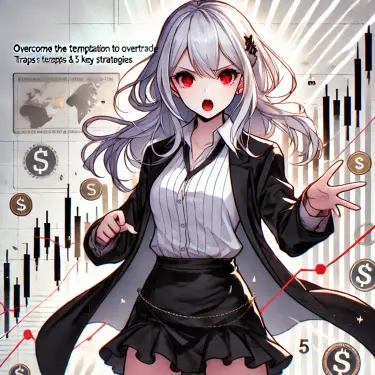Understanding Loss Aversion Bias
Definition of Loss Aversion Bias
Loss aversion bias is the tendency to overestimate the possibility of losses. This leads to behavior that prioritizes avoiding losses over seeking gains. For example, when the possibility of gaining 1 million yen and the possibility of losing 1 million yen are presented with the same probability, many people tend to fear the possibility of incurring a loss more. This shows that the psychological impact of losses is stronger than the impact of gains. Loss aversion bias is one of the universal cognitive biases that humans possess, and it influences various situations in daily life and business.
Psychological Impact of Losses
It is said that the psychological impact of losses is about twice that of gains, and it has a significant impact on judgment and behavior. For example, the possibility of losing 1 million yen tends to give us stronger anxiety and fear than the possibility of gaining 1 million yen. This psychological impact greatly influences our decision-making and is a factor that promotes risk-averse behavior. Loss aversion bias affects our rational thinking and can often promote irrational and emotional behavior.
Reasons for Loss Aversion Bias
It is thought that biological and evolutionary factors are related to the occurrence of loss aversion bias. Biologically, it is believed that humans have this bias rooted in them because avoiding losses is advantageous for survival. For example, for ancient humans, losing food or shelter was a serious problem that threatened survival. Therefore, avoiding losses was considered an important strategy to increase the probability of survival. This biological basis is thought to have been passed down to modern humans as loss aversion bias. Evolutionarily, it has been suggested that avoiding losses was important for increasing the likelihood of leaving offspring. For example, avoiding losses in dangerous hunting or gathering activities would increase the probability of leaving descendants, and that gene would be more likely to be passed on to the next generation.
Historical Background of Loss Aversion Bias
Loss aversion bias has been recognized as a principle of human behavior since ancient times. The ancient Greek philosopher Aristotle mentioned in his writings that humans tend to avoid losses. Also, in the 18th century, economist Adam Smith argued in his book ‘The Wealth of Nations’ that human behavior is influenced by loss aversion bias. Furthermore, in the latter half of the 20th century, psychologists Daniel Kahneman and Amos Tversky won the Nobel Prize in Economics for their research on loss aversion bias. Their research showed that loss aversion bias has a significant impact on human decision-making and has had a major impact on the fields of economics and behavioral economics.

Leveraging Loss Aversion in Business
Application in Pricing Strategies
Limited-time sales and discounts can stimulate loss aversion and encourage consumers to make immediate purchases. For example, when consumers see a product with a discounted price for a limited time, they tend to feel that they will lose out if they miss the opportunity, prompting them to buy quickly. This is an example of a marketing strategy that utilizes loss aversion. Limited-time sales and discounts put time pressure on consumers and drive their desire to avoid losses.
Campaigns and Promotions
Utilizing campaigns and promotions with limited periods or quantities can be a means of arousing consumer anxiety and increasing their desire to buy. For example, in a limited-quantity campaign, consumers tend to feel anxious that they might not be able to get it and rush to make a purchase. This is an effective strategy to promote consumer purchasing behavior by utilizing loss aversion. Limited-quantity campaigns give consumers a sense of scarcity and increase their desire to buy by giving them the anxiety that they might not be able to get it.
Product Improvement Approach
By devising ways to present product information, it is possible to trigger the consumer’s desire to avoid losses. For example, extending the warranty period or introducing a money-back guarantee can make users feel that they can “reduce the risk of loss,” which increases their purchase desire. This is an effective strategy to eliminate user anxiety and increase their desire to buy by utilizing loss aversion. Warranties and money-back guarantee systems provide users with a sense of security, reduce anxiety about losses, and encourage purchases.

Loss Aversion in Daily Life
Household Financial Management
When it comes to spending money within the household, we tend to make conservative choices out of fear of loss. For example, hesitating to invest or take on new ventures is often due to the psychology of fearing loss. Loss aversion can lead to missed investment and business opportunities because it tends to overestimate risks and favor safe options. Loss aversion also tends to make people overly cautious when facing new challenges or changes.
Behavior in Relationships
The psychology of loss aversion also manifests in relationships, where we tend to prioritize the disadvantages of ending a relationship over the benefits of continuing it. For example, when problems arise in a relationship, there are cases where people choose to sever the relationship rather than make an effort to repair it. This is because they fear incurring further losses by continuing the relationship. Loss aversion promotes risk-avoidance in relationships, leading to a tendency to choose separation over maintaining the relationship.
Job Changes and Career Choices
The possibility of failure can also be a factor that makes people hesitate to change jobs. For example, even if someone is dissatisfied with their current job, they may choose to maintain the status quo out of fear of losing what they have, rather than considering the potential benefits of a job change. This demonstrates that loss aversion can be a factor that makes people hesitate to take on new challenges. Job changes are often perceived as risky, and loss aversion can be a major factor in hesitating to change jobs.

Summary and Future Applications
Impact on Emotions
The loss aversion bias significantly impacts emotions, but conversely, a deeper understanding of it allows for calm judgment. For example, by recognizing when the loss aversion bias is at play, you can suppress emotional judgments and evaluate situations from a more objective perspective. Understanding the loss aversion bias allows you to minimize its impact and make more rational and calm decisions.
Strategic Decision-Making
Understanding and cleverly utilizing this bias will make decisions for individuals and organizations more effective. For example, you can develop marketing strategies that leverage the loss aversion bias to increase customer purchasing desire, or formulate investment strategies that minimize risk. Understanding the loss aversion bias is an important element for making more effective decisions.
Continuous Learning and Adaptation
It is important to continuously update your knowledge of the loss aversion bias based on new research. The loss aversion bias is a significant psychological factor that greatly influences human behavior. By deepening your knowledge of this bias and constantly grasping the latest research results, you can make more effective decisions. The loss aversion bias is constantly evolving, and it is necessary to constantly pursue the latest research results in order to deepen your understanding of it.










